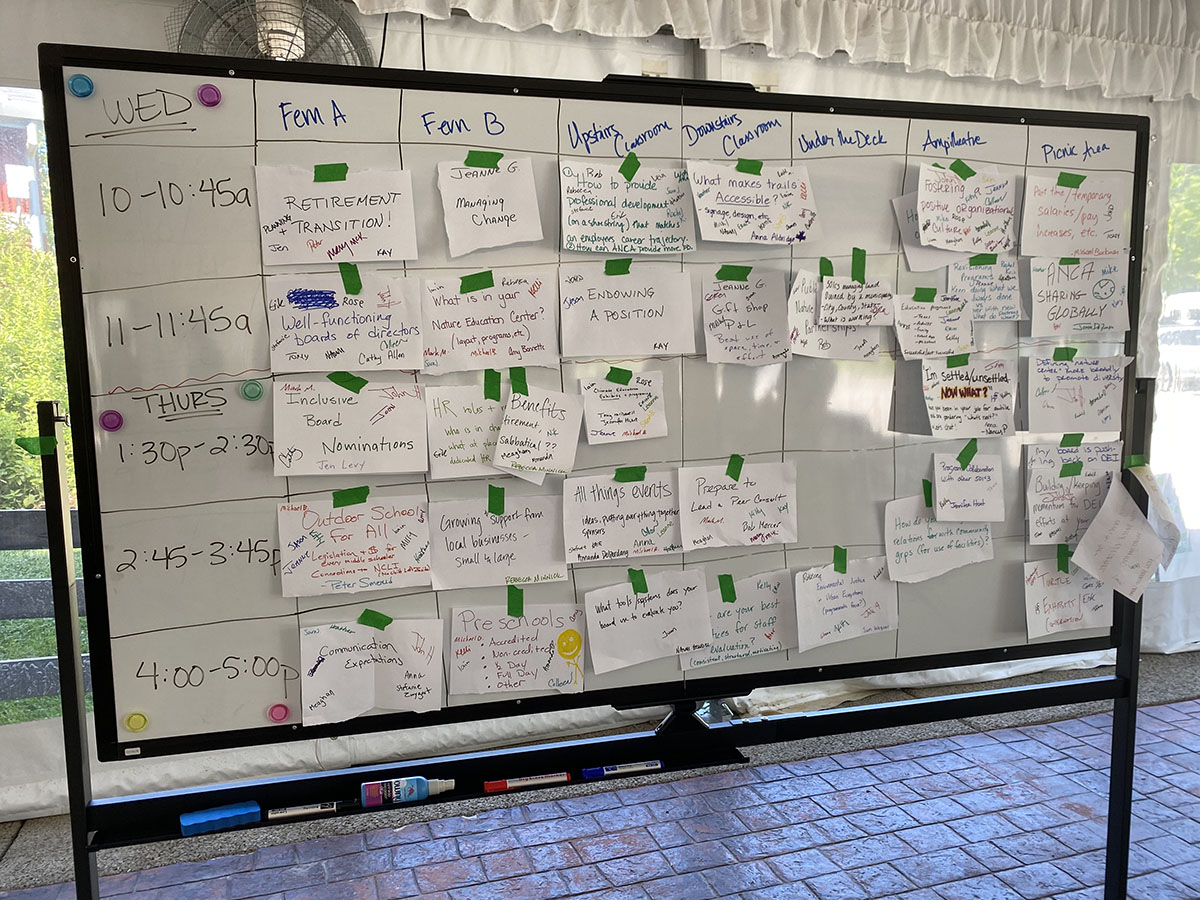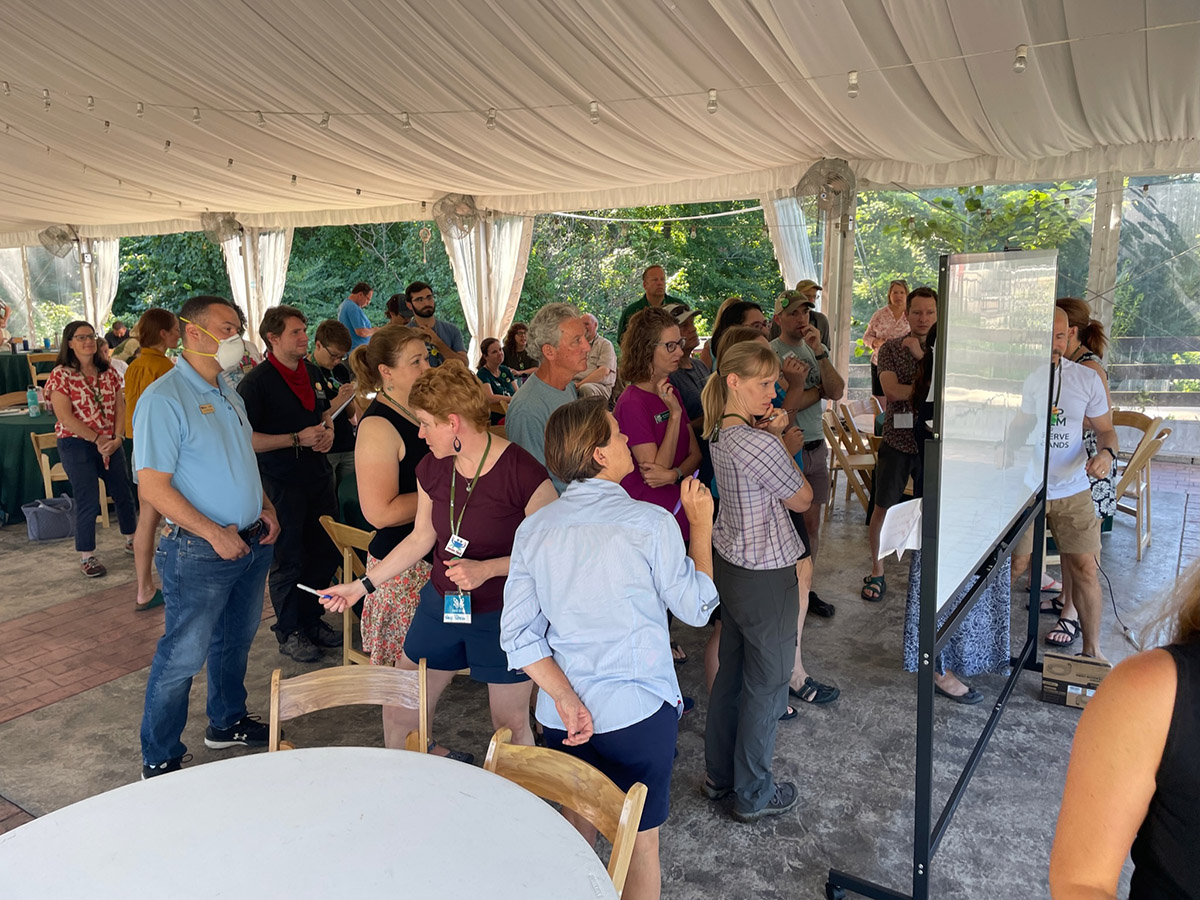ANCA hosts a variety of professional development opportunities throughout the year. As a professional association, we offer standard professional programs such as workshops and presentations, but we also provide collaborative programs where all attendees are welcome to actively participate — this is a direct reflection of our Core Values as an organization, in which we recognize the collective wisdom and diversity of our peer network as our greatest resource.
Below are the types of programs that you will typically encounter at ANCA events. Short events (such as virtual ANCA CONNECTS programs) may only have enough time for one program format, whereas multi-day events (such as the ANCA Summit) include a full variety of programs.
Types of Programs
Facilitated Discussions
Facilitated Discussions are collaborative sessions where all participants contribute to the discussion on a specific topic, and a facilitator guides the dialogue. The result is a shared discourse that brings out an abundance of perspectives. These discussions are an excellent opportunity to share with your peers, learn new ideas, discuss trends in the profession, and work together to find solutions.
The role of the facilitator is to create fair opportunities for sharing, keep the discussions on track, and make sure everyone has the opportunity to participate. Facilitated Discussions are not presentations followed by questions and answers, nor the place where the facilitator is expected to answer all of the questions.
A significant advantage of Facilitated Discussions is that all perspectives are welcome — whether you are new to the nature center field or an experienced veteran, we invite you to fully participate in the conversation.
Open Space Sessions
ANCA often conducts Open Space meetings where participants are invited to introduce topics and facilitate the discussions. In Open Space, all participants collectively suggest and select session topics and work together to create a session schedule for the given time frame. Open Space recognizes both the talent in the room as well as the topics important to attendees.
The logistics will look different depending on the type of ANCA event. When we conduct Open Space in person, all participants gather at the same time and use a whiteboard to coordinate the session topics and schedule. When we use Open Space in a virtual format, we typically use a virtual bulletin board in advance of the meeting. Regardless, all participants have the opportunity to suggest a topic and collaboratively choose other topics.
If you suggest a topic and it is chosen as a session, you will be asked to introduce the topic and facilitate the discussion among the participants. Again, the facilitator does not need to be perceived as the expert in the room, so you can simply start the conversation and engage accordingly.
This system allows you to co-create your experience, and provides the opportunity for you to be an active participant rather than a passive listener.
Note: “Open Space” is a way of conducting events that many organizations use. You may find that how ANCA facilitates Open Space is different from other groups, but there will also be core commonalities.
Workshops
Workshops are presentation-based sessions where you can learn in-depth on a single topic and broaden your skill set. Experts will introduce and present the topic. While some elements of discussion may be included, these are not primarily discussion-based programs.
Panel Discussions
Panel Discussions invite a specific group of people to discuss and share their expertise on a topic. These programs provide a blend of presentation and discussion; the panel presents the subject matter and participants also have the opportunity to engage in the conversation and ask questions.
Field Workshops
Field Workshops are an opportunity to visit nature education sites in person and learn firsthand from their operations. Representatives from the organization will host and demonstrate how they put their missions into action. Here’s where you can engage in-depth on the workshop topic while going beyond the theory, and into practice.
Principles of Open Space & Facilitated Discussions
Open Space sessions and Facilitated Discussions include cooperative elements that may be new to you in a professional development setting. In order for you to meaningfully participate in these programs, we share these principles:
- Whatever happens is the only thing that could happen. Don’t worry about what should have happened.
- Whoever shows up are the right people to be there. There is always wisdom in the room.
- Whenever it starts is the right time.
- When it’s over, it’s over! If you finish early, use the time as you best see fit.
Lastly, we apply the Law of Mobility to these sessions — this law states that if you find yourself in a situation where you are neither learning nor contributing anything, you are responsible for moving to another place, for example to another session.
We have adapted these principles and the Law of Mobility from “Open Space Technology,” developed by Harrison Owen.
 A Facilitated Discussion at the 2019 ANCA Summit.
A Facilitated Discussion at the 2019 ANCA Summit.



